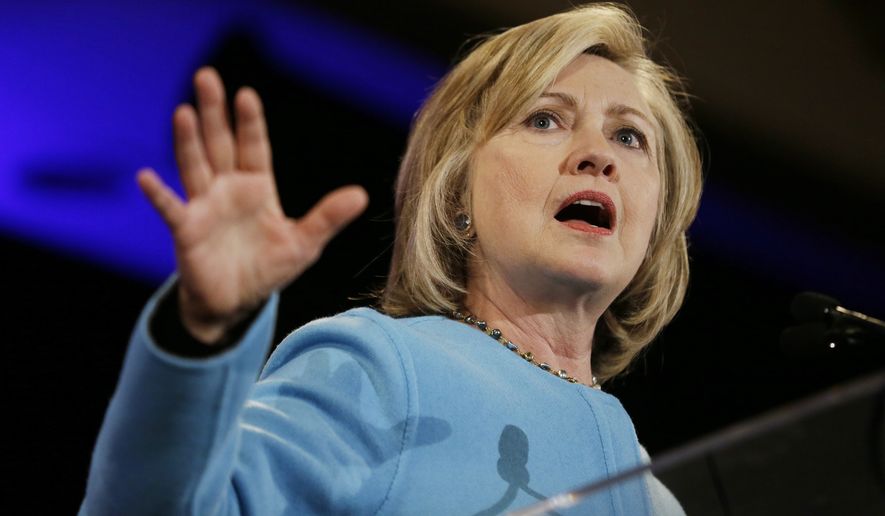One of the tea party groups targeted by the IRS asked Congress Monday to demand the private emails of some agency employees, while a top committee chairman issued a request for instant-chat messages from the EPA, as the Clinton emails scandal begins to envelop other parts of the Obama administration.
The White House, meanwhile, tried to keep the burgeoning scandal at arm’s length, with spokesman Josh Earnest acknowledging President Obama and Mrs. Clinton did email, but insisting the White House followed all record-keeping laws, and the president didn’t know Mrs. Clinton was exclusively using a private email until reports surfaced last week.
Mr. Earnest said it’s up to Mrs. Clinton to demonstrate she followed the laws and to figure out whether she needs to release more.
“If Secretary Clinton’s team decides that they want to go to even greater lengths than they already have, then, you know, that’s ultimately a decision for them to make,” Mr. Earnest said. “They are the ones that are in charge of the email server.”
Mrs. Clinton was revealed last week to have used a private email account kept on her own server when conducting official businesses.
She reportedly waved off questions from reporters in New York on Monday, and her only comment has come via a Twitter post in which she said she wants the public to see her emails.
SEE ALSO: Obama emailed Hillary Clinton at private address, didn’t know ‘details’ of account
Her silence has left fellow Democrats to field pointed questions, with some saying she needs to be more forthcoming, while others have wavered, saying they believe the issue has been stoked by Republicans eager to score political points on the presumptive front-runner for Democrats’ 2016 presidential nomination.
For now, the issue has major partisan overtones. A Pew Research Center poll found 34 percent of self-identified Republicans were very closely following the Clinton emails story last week, but only 16 percent of self-identified Democrats closely followed it.
In Washington, though, the emails are coming to be seen as just part of a problem with an administration that Mr. Obama said would be the most transparent ever.
Catherine Engelbrecht, founder of True the Vote, which had its tax-exempt application blocked for years by IRS employees, said more than a dozen current and former IRS employees may have used personal emails to try to avoid public scrutiny as they targeted tea party groups with intrusive scrutiny.
Ms. Engelbrecht said in light of the revelation that former Secretary of State Hillary Rodham Clinton used her own private email address and server to conduct official department business, the congressional committees investigating the IRS should pry more deeply into whether any agency employees did the same.
“Former Secretary Clinton’s latest news regarding third-party email use is just a continuation of a thriving culture of concealment within the Obama administration, which is growing increasingly apparent to the American public,” Ms. Engelbrecht said.
SEE ALSO: Sarah Palin: Hillary Clinton’s private email use ‘flies in the face’ of transparency
Emails from former IRS employee Lois G. Lerner, a central figure in the investigation, have already become a flashpoint in Congress’ probe into the tax agency, with an inspector general last month saying investigators were quickly able to find backup tapes to restore some of Ms. Lerner’s lost emails, despite the IRS insisting the emails were irretrievably gone.
The IRS isn’t the only agency facing scrutiny.
A federal judge last week blasted the Environmental Protection Agency for failing to follow open records laws, saying it was a black eye on an administration that touted transparency.
On Monday, House Committee on Science, Space and Technology Chairman Lamar Smith said the agency had better start turning over more documents, including emails and text messages, or else he’ll use subpoena powers to try to pry them loose.
“Documents provided by EPA demonstrate a continued lack of transparency at the agency,” the Texas Republican wrote after the agency replied two weeks late to one of his requests for documents, and provided only information that was already publicly available.
Ms. Engelbrecht said Mrs. Clinton’s case is emblematic of the problems.
“Corruption trickles downhill,” she said. “When government leaders blatantly disregard the rule of law, they send a message to the broader bureaucracy that the body politic is untouchable.”
Mrs. Clinton left the State Department two years ago, but her email practices are only just now coming to light.
The department says every previous secretary of state also used a private email account, and it is going back and requesting copies of official emails so its records can be complete.
Department spokeswoman Jen Psaki said Mrs. Clinton turned 55,000 unclassified emails over to the department, but said it’s not clear when they will be released. The spokeswoman said they have already culled the 300 emails that relate to the 2012 terrorist attack on the U.S. diplomatic post in Benghazi, Libya, and have turned those over to Congress.
Ms. Psaki also said it’s not automatically against the law to have used private email for public business, despite that being the best practice.
“It’s a policy, it’s not a federal regulation,” she said.
At the White House, Mr. Earnest said that policy is why the State Department was asking Mrs. Clinton to turn her business-related messages over.
But Mr. Earnest wouldn’t speculate on whether an independent arbiter should be called in to look through Mrs. Clinton’s emails to determine what should be turned over.
“Ultimately, this is a decision that is going to be left up to Secretary Clinton’s team to make on this,” he said.
• Stephen Dinan can be reached at sdinan@washingtontimes.com.




Please read our comment policy before commenting.